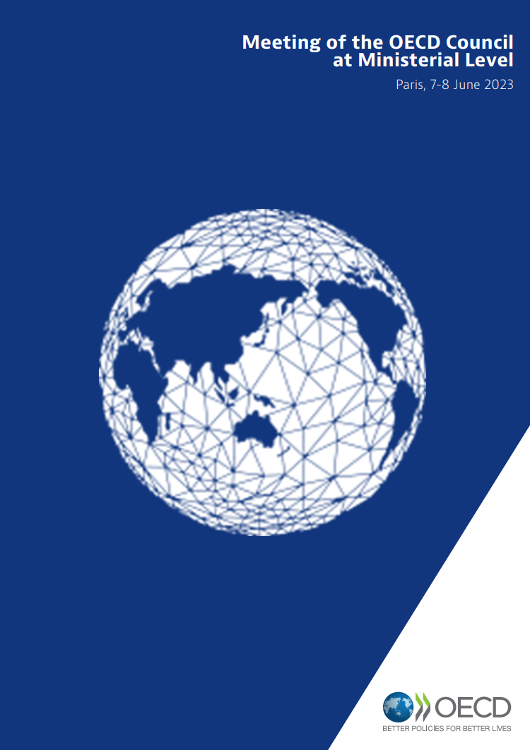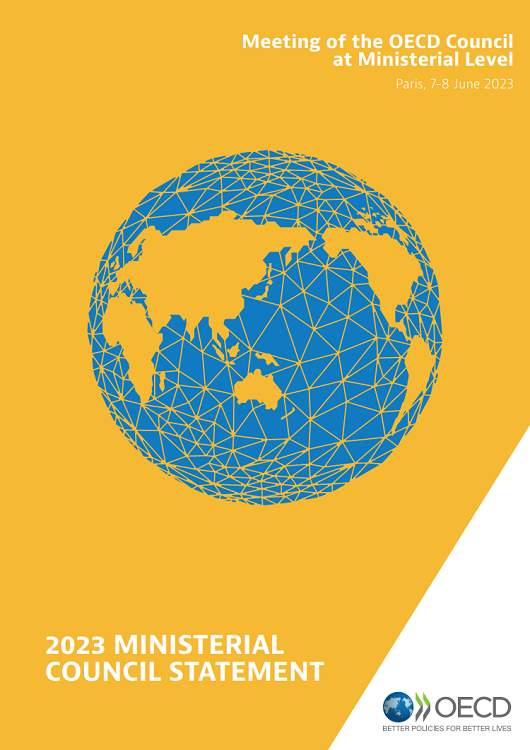Remarks by Mathias Cormann
OECD Secretary-General
OECD, 6 October 2021
Mesdames, Messieurs les Ministres; Mesdames et Messieurs les Ambassadrices et Ambassadeurs:
Cette deuxième partie de la Réunion du Conseil au niveau des Ministres 2021 – le prolongement de notre conversation de juin dernier – a été un franc succès.
Je tiens à vous remercier toutes et tous d’y avoir contribué.
Je remercie tout spécialement les États-Unis, particulièrement le Secrétaire d’État Tony Blinken, pour le rôle moteur qu’il a joué et la maîtrise avec laquelle il et ces colleagues John Kerry, Catherine Thai et José Fernandez ont a présidé notre Réunion, ainsi que nos Vice-présidents, la République de Corée et le Luxembourg.
La célébration du 60ème anniversaire de la création de l’OCDE a été l’occasion pour nous de mettre en lumière, de renouveler et de consolider nos valeurs communes.
Notre engagement en faveur de la démocratie, de l’État de droit, des droits humains, de l’égalité des genres, de la planète, ainsi que notre engagement en faveur des principes de l’économie de marché, d'un ordre international fondé sur des règles et la coopération multilatérale et de l’égalité d’opportunité permettant à tous de réaliser leur potentiel.
Cet engagement est pour nous le meilleur moyen d’instaurer les niveaux les plus élevés de croissance durable, de prospérité, de paix et de bien-être pour tous.
At this meeting we have taken an important step forward to strengthen our global reach, relevance and impact through the new OECD Global Relations Strategy.
This Strategy will ensure our engagement with non-Member countries is aligned with Members’ interests, shape our contributions to global fora, including the G20, the G7, and APEC, and help frame Members’ consideration of accession requests.
In relation to the 6 current accession applications in front of us, I thank Secretary Blinken for his very clear statement yesterday, that the US is committed to see our organization continue to grow stronger and indicating the readiness of the US to work with all our members to build consensus on a way forward, so that applicant countries that share our values and meet the OECD’s high standards can pursue a path to membership.
As discussed at our recent informal Heads of Delegations meeting, I will now be circulating a draft proposal to facilitate that consultation in coming weeks with the view of presenting a formal proposal to Council at the appropriate time in the not too distant future.
We have also charted the course for the OECD’s work across various policy areas.
Members have endorsed several important deliverables:
- the Recommendation on Enhancing Access to and Sharing of Data;
- the Recommendation on Transparency and Procedural Fairness in Competition Law Enforcement; and
- the Recommendation for Agile Regulatory Governance to Harness Innovation.
Members also welcomed:
- the OECD Dashboard to Guide a Strong, Resilient, Inclusive and Green Recovery;
- the IPAC Preliminary Dashboard of Key Indicators on Climate Action; the Report on the Implementation of the OECD Recommendation on Integrated Mental Health, Skills and Work Policy; and the Policy Framework for Gender-Sensitive Public Governance.
Over the past two days, the recovery from COVID-19 has been front and centre in all of our discussions.
Ending the health, economic, and social crises caused by the pandemic and optimising the strength and the quality of the recovery is our shared key priority.
There is strong agreement on the need to accelerate vaccine deployment across the world, including by supporting the ACT-Accelerator and its COVAX facility.
Beyond the pandemic, we have also had rich exchanges on key global challenges.
We will work to help drive higher levels of ambition and, importantly, outcomes – on mitigation, adaptation and financing.
We will work to help achieve improved outcomes that properly align with the collective goals of the Paris Agreement, recognising that this requires increased support for climate action in developing countries.
The OECD’s International Programme for Action on Climate, and our whole-of-OECD project on “Building Climate and Economic Resilience” will provide practical guidance to Members towards net zero.
I thank you for the many statements over the past two days in support of our proposal for the OECD to help facilitate a more ambitious, but also internationally more coherent, better coordinated approach to the pricing of emissions through an inclusive framework type process.
We will seek to work with you to help ensure more ambitious action on climate change can be pursued in a way that is both globally effective and fair. Effective in that it helps reduce global emissions instead of shifting emissions to other parts of the world. And fair in that every country carries a fair share of the burden.
We will work with you and through the Italian G20 Presidency to further develop our proposal to assess and report on explicit and implicit carbon pricing efforts around the world as a way to inform such a more coherent globally coordinated way forward.
Alongside the climate challenge, we also discussed:
- the importance of building an inclusive, safe, democratic and well-governed digital economy;
- strengthening the rules-based international trading system; revitalising global labour markets; and
- finalising the global agreement on a two-pillar solution to the tax challenges of digitalisation and globalisation.
We’ve had very rich discussions on all of these issues and we will be taking your reflections, perspectives and ideas forward in all areas of our work.
Underlying all of these challenges is the need to ensure equality of opportunity and that no-one is left behind, offering everyone the opportunity to participate and benefit from our economic recovery.
Later this year at the next 2021 Global Strategy Group Meeting in December we will take a close look at the challenges and opportunities of teleworking and remote education.
Across all of these areas, the OECD stands ready to support Members through our comparative data analysis, practical, pragmatic and realistic advice, best practice standards, and exchange of knowledge and best practices.
I am pleased to note Members’ broad support for the key priorities outlined in my opening remarks.
I look forward to working with you to take these priorities forward when we begin discussions on the 2023-24 Programme of Work and Budget later this year.
Let me also reiterate my commitment to ensure the Organisation remains diverse, transparent, responsive, and accountable to its Members, including through the forthcoming independent external evaluation.
Nous avons abordé de nombreuses questions au cours de ces deux jours, mais il reste encore beaucoup à faire.
Une fois encore, je tiens à remercier chacun d’entre vous pour votre participation. Vous avez tous été entendus, que vous vous soyez déplacés jusqu’ici, à Paris, ou que vous ayez participé à distance.
Je me réjouis d’ores et déjà de vous retrouver toutes et tous l’année prochaine, alors que nous continuons de guider l’OCDE, mais aussi les économies, les sociétés et les populations qu’elle représente, vers l’avenir.
Finally, let us look forward to the next few months with an intense multilateral agenda and work collectively to ensure a successful COP26, G20 Summit and WTO Ministerial.
Today’s challenges call for stronger and more effective multilateralism.
You can count on the OECD to deliver its best to promote better policies for better lives around the world.
Thank you all. Merci.

